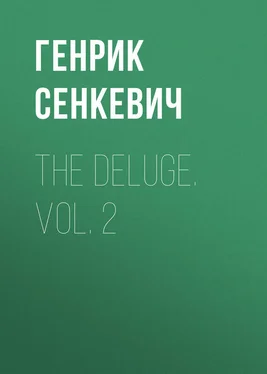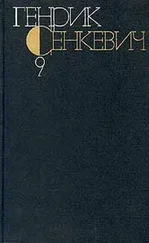Генрик Сенкевич - The Deluge. Vol. 2
Здесь есть возможность читать онлайн «Генрик Сенкевич - The Deluge. Vol. 2» — ознакомительный отрывок электронной книги совершенно бесплатно, а после прочтения отрывка купить полную версию. В некоторых случаях можно слушать аудио, скачать через торрент в формате fb2 и присутствует краткое содержание. Жанр: foreign_antique, foreign_prose, на английском языке. Описание произведения, (предисловие) а так же отзывы посетителей доступны на портале библиотеки ЛибКат.
- Название:The Deluge. Vol. 2
- Автор:
- Жанр:
- Год:неизвестен
- ISBN:нет данных
- Рейтинг книги:4 / 5. Голосов: 1
-
Избранное:Добавить в избранное
- Отзывы:
-
Ваша оценка:
- 80
- 1
- 2
- 3
- 4
- 5
The Deluge. Vol. 2: краткое содержание, описание и аннотация
Предлагаем к чтению аннотацию, описание, краткое содержание или предисловие (зависит от того, что написал сам автор книги «The Deluge. Vol. 2»). Если вы не нашли необходимую информацию о книге — напишите в комментариях, мы постараемся отыскать её.
The Deluge. Vol. 2 — читать онлайн ознакомительный отрывок
Ниже представлен текст книги, разбитый по страницам. Система сохранения места последней прочитанной страницы, позволяет с удобством читать онлайн бесплатно книгу «The Deluge. Vol. 2», без необходимости каждый раз заново искать на чём Вы остановились. Поставьте закладку, и сможете в любой момент перейти на страницу, на которой закончили чтение.
Интервал:
Закладка:
"Pray you as well," said he; "and then go."
A quarter of an hour later the four went out and repaired to the walls. The trenches in the distance were sleeping. The night was very dark.
"How many men will you take?" asked Kordetski of Kmita.
"I?" answered Pan Andrei, in surprise. "I am not leader, and I do not know the place so well as Pan Charnyetski. I will go with my sabre, but let Charnyetski lead the men, and me with the others; I only wish to have my Soroka go, for he can hew terribly."
This answer pleased both Charnyetski and the prior, for they saw in it clear proof of submission. They set about the affair briskly. Men were selected, the greatest silence was enjoined, and they began to remove the beams, stones, and brick from the passage in the wall.
This labor lasted about an hour. At length the opening was ready, and the men began to dive into the narrow jaws. They had sabres, pistols, guns, and some, namely peasants, had scythes with points downward, – a weapon with which they were best acquainted.
When outside the wall they organized; Charnyetski stood at the head of the party, Kmita at the flank; and they moved along the ditch silently, restraining the breath in their breasts, like wolves stealing up to a sheepfold.
Still, at times a scythe struck a scythe, at times a stone gritted under a foot, and by those noises it was possible to know that they were pushing forward unceasingly. When they had come down to the plain, Charnyetski halted, and, not far from the enemy's trenches, left some of his men, under command of Yanich, a Hungarian, an old, experienced soldier; these men he commanded to lie on the ground. Charnyetski himself advanced somewhat to the right, and having now under foot soft earth which gave out no echo, began to lead forward his party more swiftly. His plan was to pass around the intrenchment, strike on the sleeping Swedes from the rear, and push them toward the cloister against Yanich's men. This idea was suggested by Kmita, who now marching near him with sabre in hand, whispered, —
"The intrenchment is extended in such fashion that between it and the main camp there is open ground. Sentries, if there are any, are before the trenches and not on this side of it, so that we can go behind freely, and attack them on the side from which they least expect attack."
"That is well," said Charnyetski; "not a foot of those men should escape."
"If any one speaks when we enter," continued Pan Andrei, "let me answer; I can speak German as well as Polish; they will think that some one is coming from Miller, from the camp."
"If only there are no sentries behind the intrenchments."
"Even if there are, we shall spring on in a moment; before they can understand who and what, we shall have them down."
"It is time to turn, the end of the trench can be seen," said Charnyetski; and turning he called softly, "To the right, to the right!"
The silent line began to bend. That moment the moon lighted a bank of clouds somewhat, and it grew clearer. The advancing men saw an empty space in the rear of the trench.
As Kmita had foreseen, there were no sentries whatever on that space; for why should the Swedes station sentries between their trenches and their own army, stationed in the rear of the trenches. The most sharp-sighted leader could not suspect danger from that side.
At that moment Charnyetski said in the lowest whisper; "Tents are now visible. And in two of them are lights. People are still awake there, – surely officers. Entrance from the rear must be easy."
"Evidently," answered Kmita. "Over that road they draw cannon, and by it troops enter. The bank is already at hand. Have a care now that arms do not clatter."
They had reached the elevation raised carefully with earth dug from so many trenches. A whole line of wagons was standing there, in which powder and balls had been brought.
But at the wagons, no man was watching; passing them, therefore, they began to climb the embankment without trouble, as they had justly foreseen, for it was gradual and well raised.
In this manner they went right to the tents, and with drawn weapons stood straight in front of them. In two of the tents lights were actually burning; therefore Kmita said to Charnyetski, —
"I will go in advance to those who are not sleeping. Wait for my pistol, and then on the enemy!" When he had said this, he went forward.
The success of the sortie was already assured; therefore he did not try to go in very great silence. He passed a few tents buried in darkness; no one woke, no one inquired, "Who is there?"
The soldiers of Yasna Gora heard the squeak of his daring steps and the beating of their own hearts. He reached the lighted tent, raised the curtain and entered, halted at the entrance with pistol in hand and sabre down on its strap.
He halted because the light dazzled him somewhat, for on the camp table stood a candlestick with six arms, in which bright lights were burning.
At the table were sitting three officers, bent over plans. One of them, sitting in the middle, was poring over these plans so intently that his long hair lay on the white paper. Seeing some one enter, he raised his head, and asked in a calm voice, —
"Who is there?"
"A soldier," answered Kmita.
That moment the two other officers turned their eyes toward the entrance.
"What soldier, where from?" asked the first, who was De Fossis, the officer who chiefly directed the siege.
"From the cloister," answered Kmita. But there was something terrible in his voice.
De Fossis rose quickly and shaded his eyes with his hand. Kmita was standing erect and motionless as an apparition; only the threatening face, like the head of a predatory bird, announced sudden danger.
Still the thought, quick as lightning, rushed through the head of De Fossis, that he might be a deserter from Yasna Gora; therefore he asked again, but excitedly, —
"What do you want?"
"I want this!" cried Kmita; and he fired from a pistol into the very breast of De Fossis.
With that a terrible shout and a salvo of shots was heard on the trench. De Fossis fell as falls a pine-tree struck by lightning; another officer rushed at Kmita with his sword, but the latter slashed him between the eyes with his sabre, which gritted on the bone; the third officer threw himself on the ground, wishing to slip out under the side of the tent, but Kmita sprang at him, put his foot on his shoulder, and nailed him to the earth with a thrust.
By this time the silence of night had turned into the day of judgment. Wild shouts: "Slay, kill!" were mingled with howls and shrill calls of Swedish soldiers for aid. Men bewildered from terror rushed out of the tents, not knowing whither to turn, in what direction to flee. Some, without noting at once whence the attack came, ran straight to the enemy, and perished under sabres, scythes, and axes, before they had time to cry "Quarter!" Some in the darkness stabbed their own comrades; others unarmed, half-dressed, without caps, with hands raised upward, stood motionless on one spot; some at last dropped on the earth among the overturned tents. A small handful wished to defend themselves; but a blinded throng bore them away, threw them down, and trampled them.
Groans of the dying and heart-rending prayers for quarter increased the confusion.
When at last it grew clear from the cries that the attack had come, not from the side of the cloister, but from the rear, just from the direction of the Swedish army, then real desperation seized the attacked. They judged evidently that some squadrons, allies of the cloister, had struck on them suddenly.
Crowds of infantry began to spring out of the intrenchment and run toward the cloister, as if they wished to find refuge within its walls. But soon new shouts showed that they had come upon the party of the Hungarian, Yanich, who finished them under the very fortress.
Читать дальшеИнтервал:
Закладка:
Похожие книги на «The Deluge. Vol. 2»
Представляем Вашему вниманию похожие книги на «The Deluge. Vol. 2» списком для выбора. Мы отобрали схожую по названию и смыслу литературу в надежде предоставить читателям больше вариантов отыскать новые, интересные, ещё непрочитанные произведения.
Обсуждение, отзывы о книге «The Deluge. Vol. 2» и просто собственные мнения читателей. Оставьте ваши комментарии, напишите, что Вы думаете о произведении, его смысле или главных героях. Укажите что конкретно понравилось, а что нет, и почему Вы так считаете.











